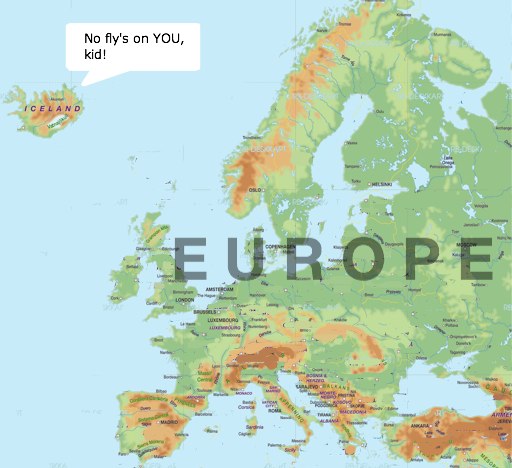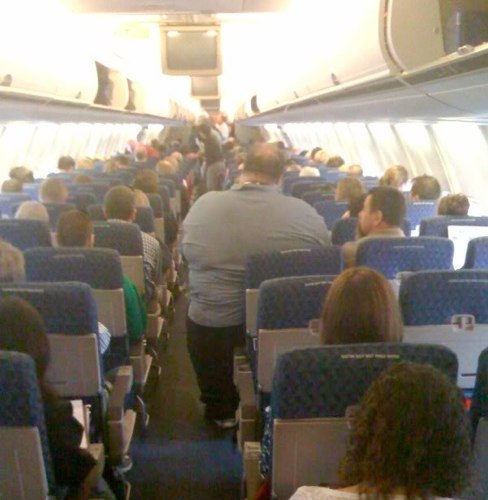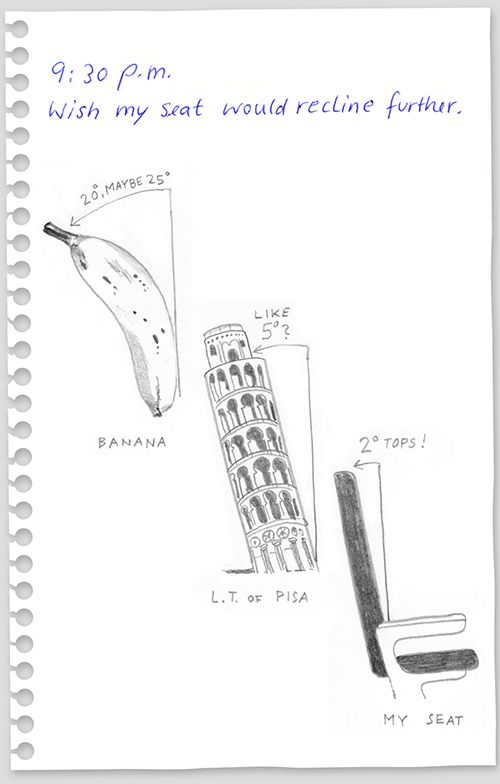The Null Device
Posts matching tags 'air travel'
2013/4/25
Another predicted consequence of global warming: transatlantic flights could get more turbulent and more expensive by the middle of the century, as the jet stream becomes more unstable:
The study, published in Nature Climate Change, suggests that by mid-century passengers will be bounced around more frequently and more strongly. The zone in the North Atlantic affected by turbulence could also increase.
"The probability of moderate or greater turbulence increases by 10.8%," said Dr Williams. "'Moderate or greater turbulence' has a specific definition in aviation. It is turbulence that is strong enough to bounce the aircraft around with an acceleration of five metres per second squared, which is half of a g-force. For that, the seatbelt sign would certainly be on; it would be difficult to walk; drinks would get knocked over; you'd feel strain against your seatbelt."
2011/11/6
British architect Lord Norman Foster has just posited plans for a huge new airport and transport development on an artificial island in the Thames Estuary. The development, to be named the Thames Hub, will include the aforementioned airport, high-speed and standard-speed rail links to London, the Channel Tunnel and the North, a container port, an industrial zone and a new Thames flood barrier and tidal energy generator.
Foster (who, among other commissions, worked on Hong Kong's decade-old airport, which is also built on an artificial island), chided Britain for having lost its taste for ambitious projects:
"We need to recapture the foresight and political courage of our 19th-century forebears, " said Foster on Wednesday, "if we are to establish a modern transport and energy infrastructure in Britain for this century and beyond."The plan has won a number of high-profile backers: industrial designer Sir James Dyson, of vacuum-cleaner fame, has backed it, and Boris Johnson (who proposed an island airport in the Thames to replace Heathrow) is in favour. However, not everyone is convinced; there are concerns that the Isle of Grain, which is to be subsumed beneath the artificial island, is both a fragile bird habitat (which would be annihilated by the airport), and a huge natural gas depot (which would pose a hazard), with additional threats posed by a sunken US warship, laden with high explosives. Also, while plans for a new airport are partly motivated by London's airports being close to capacity, some are saying that this can be better mitigated by replacing short-haul flights with high-speed rail; if there aren't all those flights departing from Heathrow for Manchester or Amsterdam, there'll be plenty of capacity for places like New York and Hong Kong. (Of course, high-speed rail suffers from all the Anglo-Saxon aversion to big projects even more than an airport would, given that one would have to placate or defeat the NIMBYs at every step of the way.)
2010/11/5
Elaborate disguise of the day: a young Hong Kong Chinese man boarded an Air Canada flight to Vancouver disguised as an elderly Caucasian man, by virtue of a latex mask:
The man changed out of the silicone mask during the flight, and was arrested on arrival in Canada; he has claimed refugee status.
The mask in question may be purchased from here, for US$689; it's said to be in low stock due to "extremely high demand".
2010/9/16
An Italian company has developed a new, ultra-compact airline seat for making economy class even more economical. Called the Skyrider, it takes only 23 inches, and involves the passenger sitting astride a saddle.
One could imagine penny-pinching airlines like Ryanair tearing out all their existing seats and replacing them with these, knowing that their clientele don't mind an hour or two of discomfort in return for getting to Ibiza or wherever for less than the train fare to the airport, though, as pointed out here, an entire jet full of these won't be possible for regulatory reasons. (Even if the total weight of the passengers sardined into it doesn't exceed the maximum carrying weight, the requirement that the aircraft can be evacuated in 90 seconds puts an upper limit on the number of passengers per exit.) The seats, it seems, aren't so much intended for budget carriers as for mixed carriers, allowing them to put in a tier below economy class, moving their lowest fares to this tier and raising the prices of their old cattle-class seats. Consequently, airlines, pressed by fuel prices and fare wars, will become slightly less unprofitable, and the flying experience will become that little bit shittier.
2010/8/20
Two years ago, a Spanish airliner crashed shortly after takeoff from Madrid, killing 154 passengers. Now, a Spanish news article (machine-translated here) claims that the crash may have been due to an aircraft maintenance computer having been infected with malware and failing to flag two faults which, had they been noticed, would have resulted in the plane having been taken out of service. If this is true, would it be the highest body count of any computer virus so far?
2010/8/9
New York Times illustrator Christoph Niemann recently flew from New York to Berlin, and spent the flight illustrating his experience. I imagine anyone who has ever taken a long-haul economy-class flight will identify with it:
2010/7/22
The (perennial) next thing: luxury passenger airships, this time from a bunch of people in London:
It straddles the concepts of a cruise ship and a hotel floating 12,000 feet in the air, with 50 rooms, including a penthouse and four duplex apartments. "There is a three-level cocktail bar at the bottom of the ship, with a thing that we call a Moon Pool - effectively it's a transparent floor - so on sunset you can sit there with your chums, sip a cocktail and look at the earth passing by underneath you, like [you're] a goddess," Mr Talbot said.Mind you, the Aircruise is still only a concept, and it is not clear whether anything like it will actually get built. (For one, there would need to be advances in materials to make it possible.)
2010/7/6
Under the new Tory/LibDem coalition government, Britain has become the first country to clamp down on airport expansion because of climate considerations; the government scrapped the third runway at Heathrow, and has committed to refusing Gatwick and Stansted new runways.
“The emissions were a significant factor” in the decision to cancel the runway-building plans, Teresa Villiers, Britain’s minister of state for transport, said in an interview. “The 220,000 or so flights that might well come with a third runway would make it difficult to meet the targets we’d set for ourselves.” She said that local environmental concerns like noise and pollution around Heathrow also weighed into the decision.The air travel industry is, expectedly, crying betrayal, while environmental activists are pleased, though uncomfortable with the decision coming from the despised Tories.
From what I understand it, the opposition to airport expansion was actually driven by the Tories, rather than having been grudgingly ceded to the Lib Dems. Could there be a Nixon-in-China thing happening here? New Labour, keen to not be mistaken for Old Labour, were anxious to avoid anything that seemed left-wing, such as opposing air travel. (It may not just have been Blairite triangulation; perhaps there was also a calculation that an ongoing age of cheap flights to credit-bought second homes in the Essex end of Spain, stag weekends in Estonia and Ecstasy-fuelled raves in the Balearics would keep the public's cool-Britannia love affair with New Labour burning, at least until the oil ran out.) The Tories, however, have less to prove as far as being pro-business goes, and can afford to pass by some of the more short-termist decisions.
A high-speed railway network is planned to replace domestic flights across Britain; it should be ready in about 20 years.
2010/7/3
Here come flying cars; only a decade or so late:
The two-seater Transition can use its front-wheel drive on roads at ordinary highway speeds, with wings folded, at a respectable 30 miles per gallon. Once it has arrived at a suitable take-off spot - an airport, or adequately sized piece of flat private land - it can fold down the wings, engage its rear-facing propellor, and take off. The folding wings are electrically powered.Robot housemaids and three-course meals in pill form are still nowhere to be seen.
In other news, airships could soon be used for transporting freight, being faster than oceanic ships and cheaper than powered aircraft. While they're only talking about freight so far, I imagine that if you outfitted them with comfortable cabins, observation decks and satellite internet access, they'd be good for recreational travel as well.
2010/4/21
A week ago, the Icelandic volcano Eyjafjallajökull started erupting, spewing a vast cloud of glassy ash into the stratosphere, and imposing a total no-fly zone on most of Europe. Now, flights are beginning to reopen (though by no means across the board; the flight your humble correspondent was scheduled to be on this afternoon, from Gothenburg to Heathrow, remains cancelled); scientists, however, say that the volcano is likely to keep erupting for some time, and some say that we can expect decades of increased volcanic activity in Iceland, meaning that there may be more flight disruptions to come.
This has had somewhat more of a personal impact on me than most things in this blog; on the day I was due to fly out to Copenhagen (for the Copenhagen Popfest), I woke to find that all flights were cancelled. After a few hours of incredulous reload-clicking, I booked expensive trains to Cologne (this was in the early hours of the disruption, before Eurostar was booked out for days to come); the following day, I caught a Eurostar to Brussels and a Thalys train to Cologne (there were no seats available on it; I spent the journey propped up in the dining car, somewhat closer to a hyperactive, tantrum-throwing toddler than I would have liked). I had been unable to book onward trains from London, but was advised to try the ticket office in Cologne; there, I was advised that the sleeper train was booked out, and that my best chance was to board it and bet on buying a ticket onboard. I did so, and somehow managed to end up in Copenhagen the following morning.
Right now, I'm in Paris, staying at a friend's place before making the journey back to Blighty; I made the decision to not go to Gothenburg (even further from London, since competition from Ryanair killed the ferry to Newcastle; let's hope that it gets reinstated soon), and caught a ride with a friend to Brussels. (Note to self: next time you're likely to be in a car on the Autobahn, bring some CDs of Kraftwerk and Neu! to put on.)
(It's somewhat ironic that a year ago, I holidayed in Iceland, and now, Iceland disrupted my holiday.)
For those stuck on the wrong side of the English Channel, there are ways across; it's true that the Eurostar's booked solid for days (and expensive to boot), as are coach services and the Calais ferry, but last time I checked, the Caen-Portsmouth ferry still had seats available.
Let's hope that this leads to some more redundancy in modes of transport in Europe; the continent has sacrificed a lot of (slower) modes of surface transport for the speed of air travel. (The lost ferry routes are one casualty; meanwhile, Britain has run its railways down, accepting the free-market wisdom that it makes more sense to fly from, say, London to Edinburgh than to spend four and a half hours on a train), which has left its transport systems dependent on one modality and, as we have seen, fragile. The results can be seen in the desperate queues of people at railway stations and the escalating credit-card bills of those involuntarily extending their hotel stays.
Finally, here is a Christopher Hitchens piece on the Eyjafjallajökull eruption and Iceland in general.
2009/12/9
Boing Boing has a post on innovative ways of gaming airlines' pricing and air-miles schemes:
I love hanging out in airmile hacker forums -- these folks are insane. My favorite is the British Airways "Lisbon Loop." BA wants to court continental passengers, so trips overseas that originate from continental Europe are much cheaper. BA flight hackers claim that they buy a BA ticket that goes Lisbon-London-NYC-London-Lisbon, and a one-way cheap EasyJet ticket to Lisbon so they can board it. On the way home, they just get off in London, saving a bundle (you can't skip the Lisbon-London leg, or BA will cancel your tickets).The ostensible topic of the post is, alas, somewhat more prosaic: a way of getting free air miles by buying US dollar coins and using them to pay off the credit card bills (through a loophole which has now apparently been closed).
2009/12/3
A photograph, taken by a flight attendant and submitted recently to an aviation industry forum illustrates the obesity crisis:
Comments on the forum, from people claiming to have worked with the attendant in question, claim that the flight was fully booked, with no spare seats, and consequently, the passenger next to the plus-sized passenger was bumped from the flight and given a voucher as compensation. This occurred in the US, where it is illegal to bill passengers for more than one seat, even if they don't physically fit into one seat. Mind you, it could apparently have turned out worse:
A good friend of mine had a similar experience sitting next to a guy who was big but I don't think as big as this, for a long-haul flight and was effectively injured by sitting for several hours in a contorted position with his fellow pax half on top of him. The airline that did that to him was utterly unsympathetic throughout a lengthy correspondence afterwards. OK, Emirates since you ask. Ironically my chum is now in a senior position with another carrier.
2009/3/23
A high school in Texas has a novel way of dealing with troubled youths: putting them in a steel cage and letting them fight it out with their bare fists:
One employee overheard Mr. Moten tell a security guard to take two students who had been at each other for days and “put ’em in the cage and let them duke it out,” the report states, and the practice was so embedded in the school’s culture that one student remarked to a teacher that he was “gonna be in the cage.”Meanwhile in Sydney, rival motorcycle gangs went on a rampage at the airport, and one man was bludgeoned to death with a
(via ![]() substitute) ¶ 0
substitute) ¶ 0
2008/10/27
London mayor Boris Johnson is the latest voice calling for a new airport to be built in the Thames estuary to replace Heathrow:
The Mayor envisages building the airport on reclaimed sand banks two miles off Sheerness, Kent, in waters 10 to 13ft deep. It would have four runways and could be expanded to six, dwarfing the capacity of Heathrow's two fully operational runways. Planes would take off and land over the sea, solving the blight of noisy engines at Heathrow and allowing the airport to operate around the clock.
Throughout its 62-year life, London's main airport has been derided as a monument to Britain's make-do-and-mend approach to planning. Its origin was inauspicious – it opened in 1946 from an army surplus tent and had to wait until 1955 for its first permanent building. The site was only chosen as an airfield in 1943 because it was a good spot from which to scramble fighter planes to protect the capital during the war. Since then, it has grown piecemeal while the capital has sprawled around it. The east-west runways ensure that the largest built-up area possible is affected by noise pollution.The new airport would cost about £40bn to build (including the costs of running high-speed rail lines and road tunnels to it), though the default alternative mooted, expanding Heathrow, would cost £13bn and come up against noise complaints.
How much one needs to expand airport capacity, of course, is another question; there is increasing demand for flights (or has been before the recession), though that's inflated by Britain's lack of high-speed rail links, meaning that Britons, by default, fly over any distance greater than London to Birmingham. This is because flying is both faster and cheaper than catching a train. (In contrast, very few people choose flying over the train when travelling between London and Paris or Brussels.) A solution to this could be to levy a tax on domestic flights within Britain, using the revenue to fast-track modern TGV-style high-speed rail links going north and west.
Having said that, London (a hub of global trade, business and tourism) does need an airport suitable for international travel, and Heathrow does have its problems. An airport on an artificial island seems more fit for purpose.
2008/7/8
If one US Department of Homeland Security official has his way, airline boarding passes could be replaced with GPS-enabled wristbands containing remotely activated electric shock devices, which could be used not only to keep track of passengers but also to incapacitate any passengers found to be of a terroristic bent, allowing the rest of us to feel safer.
2008/6/5
With the continuing rise in oil prices, some are saying that the age of cheap flights is over, as airlines raise their prices and/or collapse. Think about the implications of that for a moment: historic Eastern European town centres empty of drunken Britons, speculators unable to flog second homes on the Bulgarian Riviera to Ryanair junkies from Gillingham, people actually packing onto trains to go from, say, London to Manchester (and Britain's chronically underfunded railway infrastructure creaking under the weight of the extra patronage). As for bargain shopping in New York, forget it: if you want to see New York, your best bet may be to buy an Xbox 360 and Grand Theft Auto IV. Perhaps the end of the age of cheap travel will finally usher in the Stay-At-Home Century, when tomorrow's people will range as far from their homes as their mediæval peasant ancestors, instead communicating through broadband links.
Meanwhile, General Motors is shutting down four plants that make its Hummer SUV, which for a long time embodied the ugly side of the American Dream. This is after gasoline (that's petrol to the Europeans/Australians reading this) reached $4 a gallon (incidentally, breaking the mechanical pumps at some older gas stations, whose designers never envisioned a gallon of gasoline costing more than $3.99), and dealerships are having trouble moving the hulking behemoths. Perhaps soon we will hear an old joke about Eastern Bloc cars being repurposed?
And still in America, CNN is now running articles about whether the age of the railroads has returned. (Mostly in reference to Europe and Asia as the paragons of modernity.)
2006/6/15
The Irish government has threatened to search all US aircraft landing on its airports after a manacled military prisoner was found on one such flight from Kuwait. This comes in the wake of the "extraordinary rendition" row. Of course, were this to happen, the US could just shift its refuelling to Britain; even if the British government were to do the same (which is unlikely, at least on Blair's watch), British police might not have the jurisdiction to search aircraft landing at US bases.
Meanwhile, new testimony about Howard Hughes' secret night flights to visit a prostitute with a diamond in her tooth looks set to reopen a lawsuit from a former petrol station attendant who claims that Hughes left him US$156M in his will.
2005/8/17
The great American obesity epidemic claims another toll; as airlines find their passenger weights climbing, they are jettisoning luxuries such as phones, magazines and lifevests to bring the planes back under the limit:
This week, the federal aviation administration revised guidelines used by airlines to calculate how much weight they have on board to take account of the fact that Americans are getting fatter. The FAA has added 8% to a male and 18% to a female traveller in an attempt to ensure that the centre of gravity, takeoff speed and fuel needs for planes can be more accurately estimated.
"Maybe instead of just using those [boxes] at the gates to limit carry-on bags to certain sizes, the airlines need to have a people-sizer with a sign asking, 'Do you fit into this?'" Dave Grotto, of the American Dietetic Association, told the Chicago Tribune.
Given people's propensity to lie about their weight, airlines were told to add 4.5kg (10lb) to the figure they were told. "They usually lie in the single digits," said Peggy Gilligan, the FAA's director of flight standards.
(via ![]() substitute) ¶ 2
substitute) ¶ 2
2004/11/6
The increasing weight of passengers is costing airlines in the US US$275m a year:
Through the 1990s, the average weight of Americans increased by 10 pounds, says the Centers for Disease Control and Prevention. The extra weight caused airlines to spend $275 million to burn 350 million more gallons of fuel in 2000 to carry the additional weight, the federal centers estimated in a recent issue of the American Journal of Preventive Medicine.
The extra fuel burned had an environmental impact, as an estimated 3.8 million extra tons of carbon dioxide were released into the air, the study says.
Perhaps the solution would be to weigh passengers with their luggage and use the combined sum as an allowance? In the most obesogenic regions (i.e., the ones with no footpaths and no facilities within walking distance of homes), they could install cattle-weighing scales at the airports. (via bOING bOING)
2004/7/21

